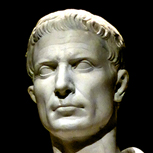The ROMAN CIVILIZATION
IMAGES OF THE ROMAN CIVILIZATION
THE CIVIL WAR
FROM DICTATOR TO EMPEROR AND EMPIRE
The last half of the century of the Roman Republic is known as the Imperatorial period. This period is characterized by great generals and politically powerful men competing for control over the state. Subsequently, great battles of men occurred including the likes of Julius Caesar, Marc Antony, and Octavian.At this point in Roman history, the mid 1st century, a long drama with many twists and turns and civil wars began. Men such as Crassus, Pompey, and Caesar were fighting for supreme control over the Empire with men such as Brutus and Cassius who were fighting to restore a Republic. After Julius Caesars' assassination. This fight between supreme authority and the restoration of a Republican ideal of government leads us to Octavian defeating Marc Antony and assuming the title of Augustus from senate in 27 BC. He transforms Rome into a hereditary monarchy that would last 500 years. Even though he didn't out right proclaim a dictatorship because the senate still existed Rome had been transferred to absolute power of a ruler.
Time line 135 BC-27 BC
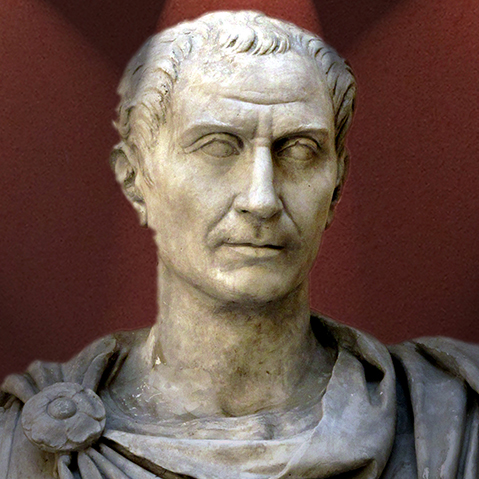
Gaius Julius Caesar
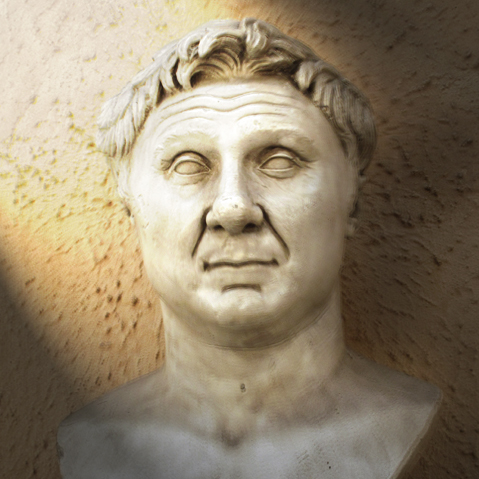
Gnaeus Pompeius Magnus
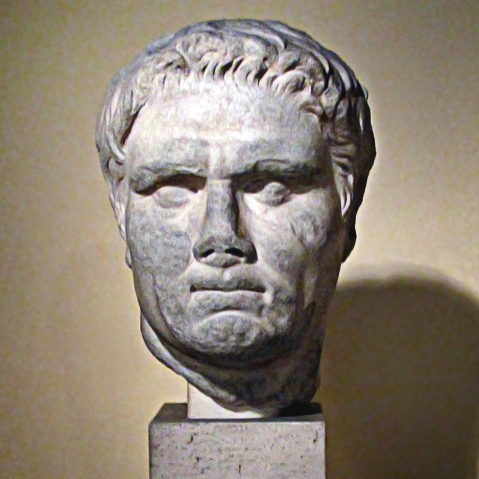
MARCUS ANTONIUS
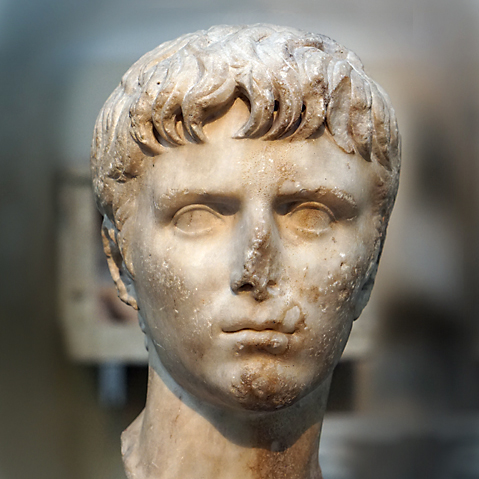
GAIUS JULIUS OCTAVIUS
EVENTS THAT LEAD TO THE END OF THE REPUBLIC 135 BC - 27 BC
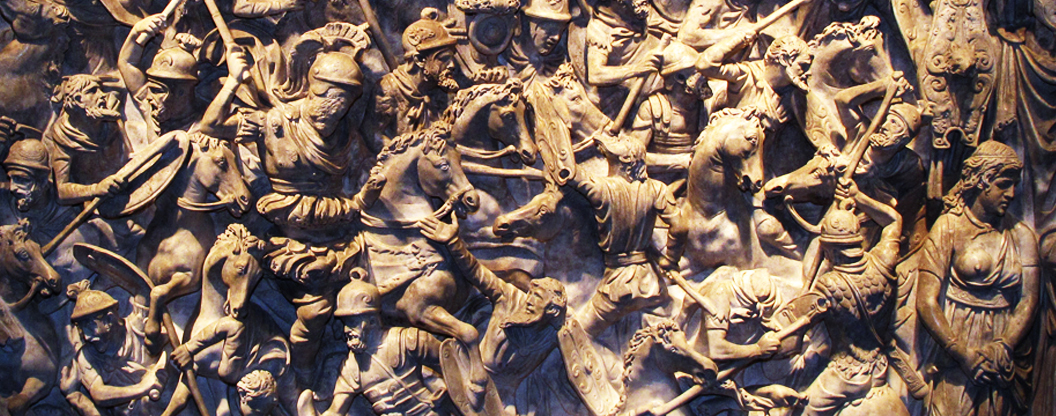
THE ROMAN REPUBLIC The precise event which signaled the end of the Roman Republic and the transition into the Roman Empire is a matter of interpretation. Towards the end of the period a selection of Roman leaders came to so dominate the political arena that they exceeded the limitations of the Republic as a matter of course. Historians have variously proposed the appointment of Julius Caesar as perpetual dictator in 44 BC, the defeat of Mark Antony at the Battle of Actium in 31 BC, and the Roman Senate's grant of extraordinary powers to Octavian (Augustus) under the first settlement in 27 BC, as candidates for the defining pivotal event ending the Repub
ic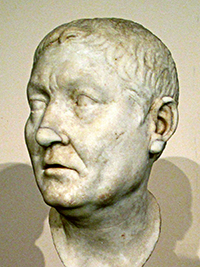
Marius
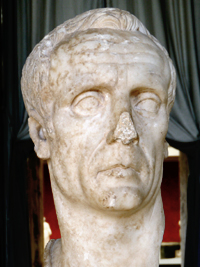
Sulla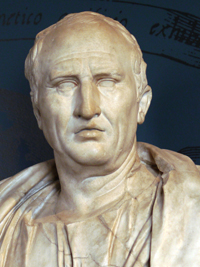
Cicero 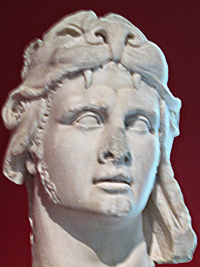
Mithridates VI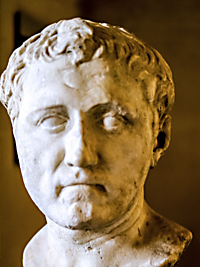
Pompey
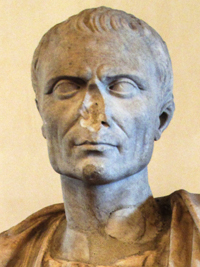 Julius Caesar
Julius Caesar
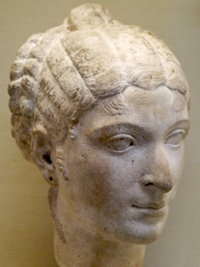
Cleopatra
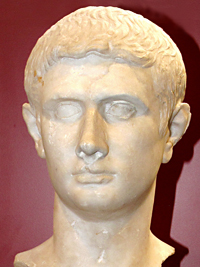
Brutus
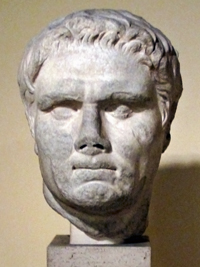 Mark Antonius
Mark Antonius
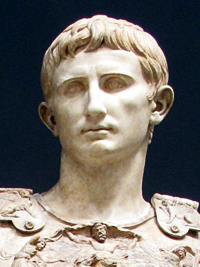 Augustus
Augustus
the civil war campaigns
fought in Italy, Albania, Greece, Egypt, Africa, and Hispania
• 49 BC:
• January 10: Julius Caesar leads his army across the Rubicon, which separates his jurisdiction (Cisalpine Gaul) from that of the Senate (Italy), and thus initiates a civil war.
• February, Pompey's flight to Epirus (in Western Greece) with most of the Senate
• March 9, Caesar's advance against Pompeian forces in Hispania
• April 19, Caesar's siege of Massilia against the Pompeian Lucius Domitius Ahenobarbus, later the siege was conducted by Caesarian Gaius Trebonius
• June, Caesar's arrival in Hispania, where he was able to seize the Pyrenees passes defended by the Pompeian L. Afranius and M. Petreius.
• July 30, Caesar surrounded Afranius and Petreius's army in Ilerda
• August 2, Pompeians in Ilerda surrendered to Caesar
• August 24: Caesar's general Gaius Scribonius Curio, is defeated in North Africa by the Pompeians under Attius Varus and King Juba I of Numidia (whom he defeated earlier in the Battle of Utica, in the Battle of the Bagradas River), and commits suicide.
• September Decimus Junius Brutus Albinus, a Caesarian, defeated the combined Pompeian-Massilian naval forces in the naval Battle of Massilia, while the Caesarian fleet in the Adriatic was defeated near Curicta
• September 6, Massilia surrendered to Caesar, coming back from Hispania
• October, Caesar appointed Dictator in Rome; presides over his own election as consul and resigns after eleven days
• 48 BC:
• January 4, Caesar landed at Dyrrhachium (Durazzo)
• March, Antony joined Caesar
• April, Battle of Dyrrhachium
• July 10: Battle of Dyrrhachium, Julius Caesar barely avoids a catastrophic defeat by Pompey in Macedonia, he retreats to Thessaly.
• August 9: Battle of Pharsalus: Julius Caesar decisively defeats Pompey at Pharsalus and Pompey flees to Egypt.
• Julius Caesar is named consul for a period of five years
• September 28, Caesar learned that Pompey was assassinated.
• Siege of Alexandria
• October, Pharnaces, King of Bosporus defeated the Caesarian Gnaeus Domitius Calvinus in the Battle of Nicopolis (or Nikopol)
• December: Battle in Alexandria, Egypt between the forces of Caesar and his ally Cleopatra VII of Egypt and those of rival King Ptolemy XIII of Egypt and Queen Arsinoe IV. The latter two are defeated and flee the city; Cleopatra becomes queen of Egypt. During the battle part of the Library of Alexandria catches fire and is burned down.
• Caesar is named Dictator for one year.
• 47 BC
• February: Caesar and his ally Cleopatra defeat the forces of the rival Egyptian Queen Arsinoe IV in the Battle of the Nile, Ptolemy was killed, Caesar then relieved his besieged forces in Alexandria
• May: Caesar defeated Pharnaces II of Pontus, king of the Bosporus in the Battle of Zela.
(This is the war that Caesar tersely described veni, vidi, vici.)
• Pharaoh Cleopatra VII of Egypt promotes her younger brother Ptolemy XIV of Egypt to co-ruler.
• August, Caesar quelled a mutiny of his veterans in Rome.
• October, Caesar's invasion of Africa, against Metellus Scipio and Labienus, Caesar's former lieutenant in Gaul
• 46 BC
• January 4: Caesar narrowly defeats his former second in command Titus Labienus in the Battle of Ruspina; nearly 1/3 of Caesar's army is killed.
• February 6: Caesar defeats the combined army of Pompeian followers and Numidians under Metellus Scipio and Juba in the Battle of Thapsus. Cato commits suicide. Afterwards, he is accorded the office of Dictator for the next ten years.
• November: Caesar leaves for Farther Hispania to deal with a fresh outbreak of resistance.
• Caesar, in his role as Pontifex Maximus, reforms the Roman calendar to create the Julian calendar. The transitional year is extended to 445 days to synchronize the new calendar and the seasonal cycle. The Julian Calendar would remain the standard in the western world for over 1600 years, until superseded by the Gregorian Calendar in 1582.
• Caesar appoints his grandnephew Gaius Octavius his heir
• 45 BC
• January 1: Julian calendar goes into effect
• March 17: In his last victory, Caesar defeats the Pompeian forces of Titus Labienus and Pompey the younger in the Battle of Munda. Pompey the younger was executed, and Labienus died in battle, but Sextus Pompey escaped to take command of the remnants of the Pompeian fleet.
• The veterans of Caesar's Legions Legio XIII Gemina and Legio X Equestris demobilized. The veterans of the 10th legion would be settled in Narbo, while those of the 13th would be given somewhat better lands in Italia itself.
• Caesar probably writes the Commentaries in this year
• 44 BC
• Julius Caesar is named Dictator perpetuo ("dictator in perpetuity")
• Julius Caesar is assassinated on March 15, the Ides of March.
